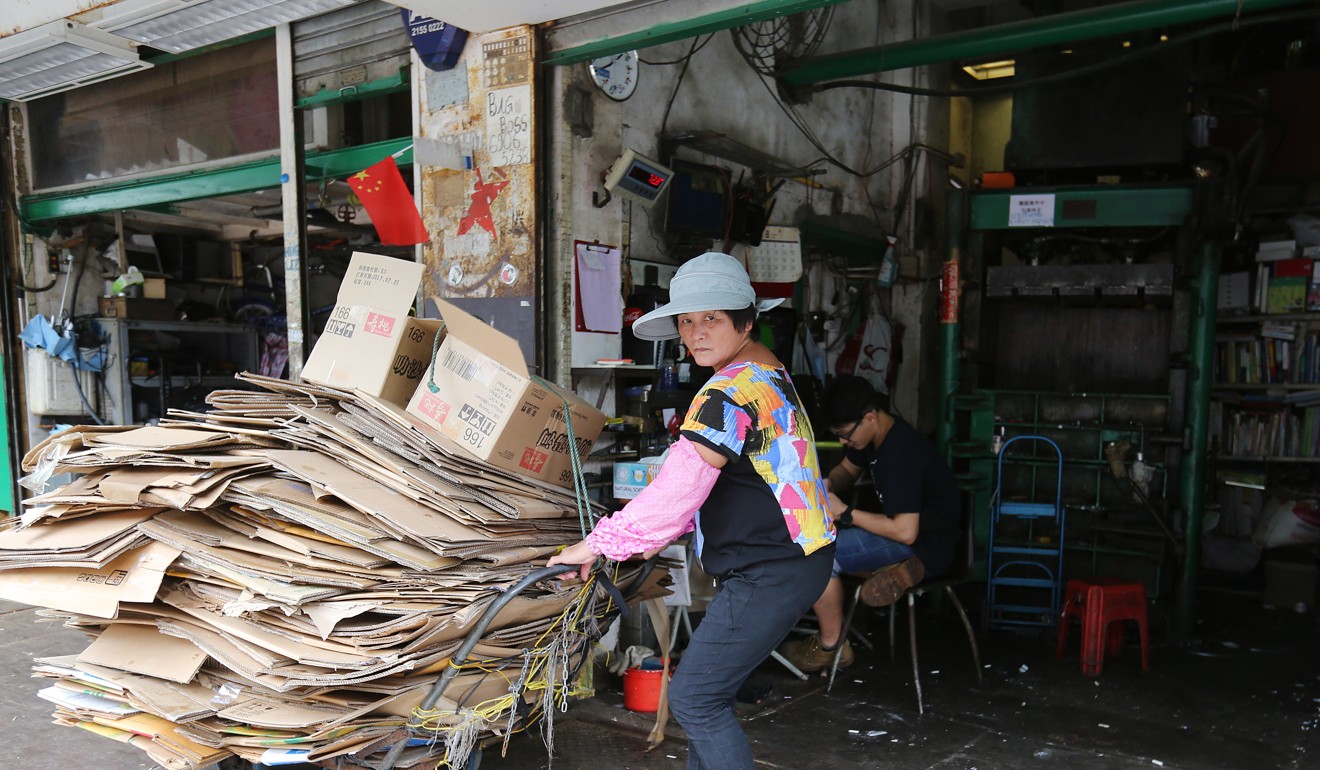
Hong Kong braces for cardboard pile-ups as recycling price falls in response to a major factory slashing payments and US-China trade war
- Recycling industry warns of plan by huge paper plant on mainland to offer HK$600 per tonne to city exporters, a drop of 45% on December
- Price crash risks putting companies and street workers out of business, as well as causing chaos on streets with mounting waste
Hong Kong faces a build-up of cardboard on the streets and in landfill with recycling prices set to drop to a new two-decade low, putting the livelihood of frontline workers at risk.
A leading paper factory on mainland China has plans to cut the price it pays local waste exporters to HK$600 (US$77) per tonne, according to the Hong Kong Recycle Materials and Reproduction Business General Association, amid lower demand for cardboard among Chinese factories caught in the crossfire of the US-China trade war.
Jacky Lau Yiu-shing, the association’s director, recalled the export price was about HK$1,100 to HK$1,200 per tonne last December, meaning cardboard collectors could sell what they gathered from the streets for about HK$0.7 to HK$0.8 per kilogram.
Prices have fallen since then, with those frontline workers now only receiving HK$0.4 to HK$0.5 per kilogram.

That is poised to tumble to HK$0.1 per kilogram on the back of the slump in export rate, the association said, the lowest for more than 20 years.
“After the price goes so low, those who work on the front line will stop picking [paper waste] because they cannot earn a living by it and buy a meal box through collecting waste,” Lau said, adding it could force businesses to close.
He said local exporters could not survive being paid HK$600 per tonne, so his members had not signed new export orders at that price.
They were expected to finish their current deals, signed at a rate of around HK$900 per tonne, on June 15.

Lau said manufacturers making toys, clothes and electrical appliances required fewer packaging boxes and other paper materials amid the ongoing trade dispute between China and the US.
But he noted the tariff spat only had limited impact on the price drop because mainland factories still bought paper waste at around 1,900 yuan (US$275) per tonne from Chinese recycling businesses.
The major factor was the mainland factory cutting its buying price, he added.
“The US-China trade war has a little bit of effect because the demand would be lower. But this is not the biggest problem. The biggest problem is the mainland factory wants to earn more when it has a chance,” he said.
She’s ‘very tired’, but granny, 89, needs to sell cardboard to help family
Hahn Chu Hon-keung, director of environmental advocacy at The Green Earth, said elderly people who usually worked as cardboard pickers might not want to continue their collections given the low rates.
As a result, more waste paper would end up in landfill.
To tackle the challenges, he suggested big recycling exporters and companies cut their margins, so the industry could be sustainable.
“Those who suffer most or have the least bargaining power are the ones who work on the front line,” he said.
He said big companies would also go under if those who work at the lower end of the supply chain could not survive.
To help small firms, he added, the government could provide temporary sites for local recycling firms to store their paper waste, so they could sell them when the price surged again.
Waste paper weighing tens of thousands of tonnes was collected every month from Hong Kong streets, according Hong Kong Census and Statistics, often by “cardboard grannies” who struggle to make a living.
Most of it was exported to the mainland.

